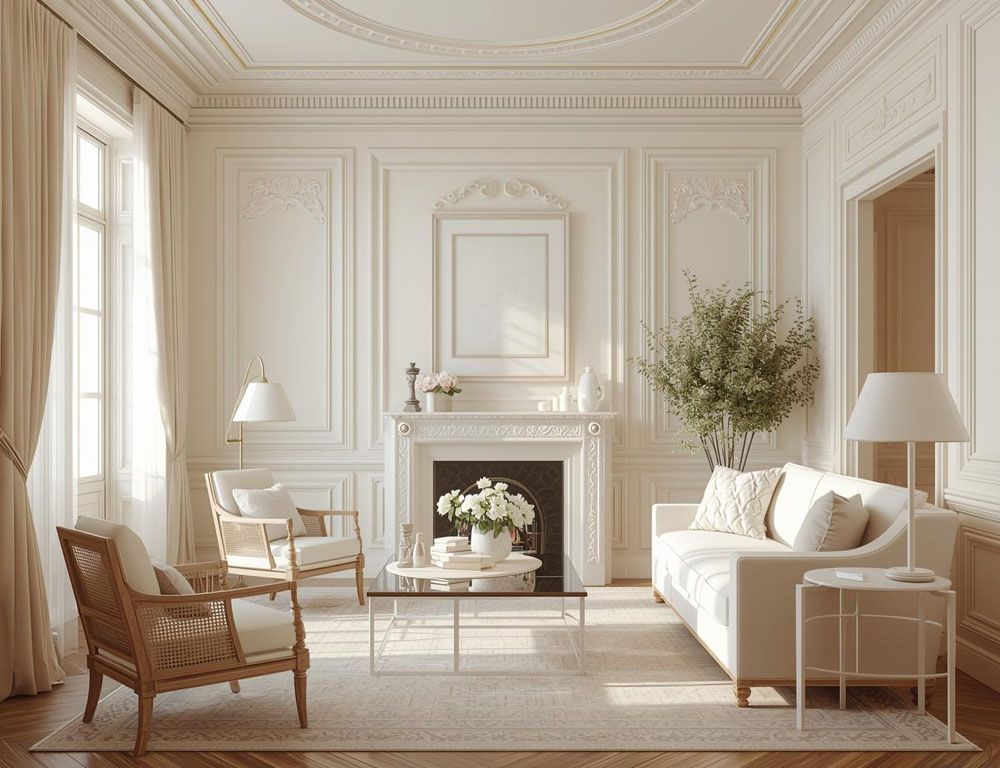Contents
Architectural interior decoration is where walls and windows stop behaving like a background and start acting like part of the story. Instead of “pick a sofa, toss in a rug, hope for the best,” you are shaping volume, light, and flow from the start. It sits at that sweet spot between architecture and interior design, where the structure of a space and the way people live in it finally talk to each other.
Think of architectural interior design as zooming in from the city skyline right down to the door handle. The same mind that thinks about sightlines, proportions, and circulation also decides where the kitchen island goes, how high the shelving should be, and which materials make sense under real shoes and real coffee cups. When you treat form and function in design as equal partners, the result is a home or workplace that feels both beautiful and strangely effortless to use.
So what is architectural interior decoration in practice? It is the moment a plan stops being lines on a drawing and becomes a set of lived experiences: where you drop your bag, how the morning light hits the breakfast nook, how a hallway can feel like a gallery instead of a tunnel.
When Architecture Walks Into The Room
A lot of projects still treat architecture and interior design like separate downloads. One team does the shell, another “adds furniture later,” and everyone wonders why the result feels slightly off. Interior architectural design tries to fix that. It brings the structural thinking of architecture inside, then layers furnishings and finishes on top of it.
If you have ever asked how to combine architecture and interior design without them fighting each other, this is it. An architectural interior design firm will look at ceiling heights, window placement, and circulation, then decide where built in seating, wall niches, or lighting should go before anyone orders a sofa. That is architectural interior decoration behaving like a conductor instead of an afterthought.
Making Form And Function Finally Get Along
There is an old myth that you have to choose between pretty and practical. Balancing form and function in design is about refusing that choice. Good architectural interior design does not ask whether a space looks good or works well; it asks how both can happen at the same time.
Designing for beauty and function starts with questions like: Where does clutter naturally pile up? Where do people pause? Where do they rush through? Out of that come functional interior design ideas such as integrated benches with hidden storage, charging shelves in hallways, or kitchen layouts that match how people actually cook instead of how brochures look.
How To Balance Form And Function In Interior Spaces
If you want a simple rule for how to balance form and function in interior spaces, try this:
- Draw the invisible paths first.
- Place the essentials along those paths.
- Only then decide what can become a feature.
When the way people move comes first, every curve, color, and material can be chosen to support that movement. Form stops being decoration taped on at the end and becomes part of the way the room works. That is real architectural interior decoration, even if you are “just” rearranging a living room.
Multi Purpose Spaces And Open Rooms That Actually Work
Everyone loves the idea of open concept living until the TV, dining table, and desk are all arguing with each other in one big echoing box. Architectural interior design thinks in multi-purpose spaces from the start. Instead of one giant undefined zone, you get layers: a reading corner tucked into a structural niche, a low cabinet that separates dining from lounging, or a change in ceiling treatment that marks where the kitchen ends.
Open concept living becomes calmer when you plan transforming spaces that can shift roles over a day. A dining table that expands for guests, sliding panels that hide a workspace, or a raised platform with storage drawers underneath are classic examples. Cabinets and storage become architecture, not random boxes added later. Even in offices and hospitality projects, good commercial space planning uses the same approach, carving out zones for focus, collaboration, and pause without making people feel boxed in.
How To Design Multi Purpose Spaces Without Chaos
If you are wondering how to design multi-purpose spaces that do not feel like a furniture warehouse, start with three anchors: one surface to work or eat at, one generous piece to sit or lounge on, and one vertical element like a bookcase or screen to define a zone. Everything else should either fold, stack, roll, or hide. When the big pieces are calm and clear, architectural interior decoration can do its job quietly in the background.
Materials, Light, And Wellness As Co Designers
Architectural interior decoration is not just about where the walls go; it is also about what those walls are made of and how they meet the light. Natural building materials such as wood, stone, clay plaster, and real textiles age in a way that adds character instead of damage. When they are chosen well, they support green building practices by lasting longer and often carrying a lower environmental cost than synthetic lookalikes.
Designing with plants is one of the simplest ways to soften strict geometry. A climbing vine on a structural column or a row of planters along a glass wall can make a hard edge feel intentional instead of harsh. Add in color psychology in design and you start using hue as another structural element: cooler tones to pull walls back, warmer ones to bring surfaces closer, deeper shades to anchor seating areas.
Interior design for wellness sits at the intersection of all this. It asks how daylight, acoustics, materials, and layout affect focus, sleep, stress, and social connection. When wellness becomes a design brief instead of a buzzword, interior architectural design starts to feel less like styling and more like quiet health care for your daily routine.
How To Use Natural Materials In Interior Design Without Overdoing It
A simple way to think about how to use natural materials in interior design is to pick one starring role and two support acts. Maybe it is a timber ceiling with stone countertops and linen upholstery, or clay walls with wood floors and wool rugs. Architecturally, that trio becomes the “language” the space speaks. Everything else, from small decor to hardware, just adds an accent instead of noise.
Style Stories Inside Architectural Interior Decoration
All of this theory shows up differently depending on taste. Modern architectural interior design might use long horizontal lines, large glass panels, and slim steel details, then warm everything with wood built ins and soft fabrics. Minimalist architectural interior decoration pares the palette back even further, letting a staircase, a window seat, or a single sculptural light carry most of the visual weight.
Luxury architectural interior design is less about gold and more about precision. Perfectly aligned joints, stone that wraps from floor to wall, or doors that disappear into paneling are all quiet lux moves. Residential architectural interior design leans into how families, couples, or solo dwellers really live, turning mudrooms, kitchens, and bedrooms into spaces that gracefully handle mess and rest. Commercial architectural interior design and commercial space planning, on the other hand, have to think about crowds, routes, branding, and maintenance, so every surface and junction is chosen for both impact and durability.
Bringing Beauty And Function Into The Same Room
In the end, architectural interior decoration is really about designing for beauty and function at the same time. You are not choosing between a room that photographs well and a room that works; you are insisting on both. When architecture and interior design are treated as one continuous process, details like multi-purpose spaces, natural building materials, and thoughtful cabinets and storage stop feeling like upgrades and start feeling like the obvious way to build.
Whether you are sketching a new house, reworking an office, or simply staring at your living room wondering why it feels “almost right,” borrowing from architectural interior design can change the conversation. Ask where the movement goes, what the light does, which materials make sense, and how the space could be transforming spaces instead of static ones. That is where form and function in design finally shake hands, and where rooms start to feel less like containers and more like places you actually want to be in every day.



